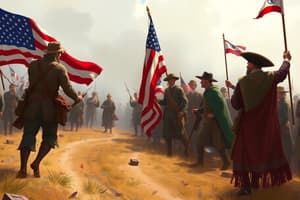Podcast
Questions and Answers
Which individual is primarily recognized as the author of the Declaration of Independence?
Which individual is primarily recognized as the author of the Declaration of Independence?
What was the main economic policy governing the relationship between the American colonies and Britain before the revolution?
What was the main economic policy governing the relationship between the American colonies and Britain before the revolution?
What principle emphasizes the importance of preventing tyranny by dividing government powers?
What principle emphasizes the importance of preventing tyranny by dividing government powers?
Which outcome of the American Revolution involved a significant shift in social and political dynamics despite ongoing issues?
Which outcome of the American Revolution involved a significant shift in social and political dynamics despite ongoing issues?
Signup and view all the answers
Which of the following figures was crucial in securing French support for the American Revolution?
Which of the following figures was crucial in securing French support for the American Revolution?
Signup and view all the answers
What was a central grievance of the colonists regarding British taxation?
What was a central grievance of the colonists regarding British taxation?
Signup and view all the answers
What role did Enlightenment ideas play in the American Revolution?
What role did Enlightenment ideas play in the American Revolution?
Signup and view all the answers
Which event marked the beginning of armed conflict between British forces and colonial militias?
Which event marked the beginning of armed conflict between British forces and colonial militias?
Signup and view all the answers
Which figure was instrumental in using propaganda to foster colonial unity and resistance?
Which figure was instrumental in using propaganda to foster colonial unity and resistance?
Signup and view all the answers
What did the Declaration of Independence formally assert?
What did the Declaration of Independence formally assert?
Signup and view all the answers
How did British mercantilist policies affect colonial economic opportunities?
How did British mercantilist policies affect colonial economic opportunities?
Signup and view all the answers
Which battle is considered a turning point in the American Revolution?
Which battle is considered a turning point in the American Revolution?
Signup and view all the answers
What was the outcome of the Battle of Yorktown?
What was the outcome of the Battle of Yorktown?
Signup and view all the answers
Study Notes
Causes of the American Revolution
- Growing discontent with British policies: Colonists felt increasingly burdened by British taxes and regulations, viewing them as unjust and infringing on their liberties. The Stamp Act, Townshend Acts, and Tea Act were particularly contentious.
- Taxation without representation: A central grievance was the lack of representation in the British Parliament. Colonists argued that they should not be taxed without having elected representatives to voice their interests.
- Restrictions on trade and economic opportunity: British mercantilist policies aimed at controlling colonial trade and benefiting Britain often stifled colonial economic growth and development. Navigation Acts, for example, limited colonial trade to British ships and ports.
- Colonial desire for self-governance: Colonists increasingly sought greater autonomy and control over their own affairs, desiring greater freedom from British imperial control.
- Enlightenment ideas: Philosophical concepts like natural rights, popular sovereignty, and social contracts, prevalent in the Enlightenment, fueled colonial resistance to British rule. These ideas emphasized individual liberties and the right to self-determination.
- Propaganda and agitation by colonial leaders: Figures like Samuel Adams and Patrick Henry effectively used pamphlets, speeches, and other forms of propaganda to foster resentment against British policies and encourage colonial unity.
- Boston Massacre and Boston Tea Party: These events highlighted tensions between colonists and British troops, escalating the conflict and solidifying colonial resistance.
Key Events of the Revolution
- Continental Congresses: Meetings of delegates from the 13 colonies seeking to organize resistance to British policies.
- Battles of Lexington and Concord: Marked the beginning of armed conflict between British forces and colonial militias.
- Declaration of Independence: Formal declaration of the 13 colonies' separation from Great Britain, asserting their right to self-governance and listing grievances against the King.
- Battle of Saratoga: A crucial turning point in the war, demonstrating to the French that the colonists had a realistic chance of winning. This led to crucial French military and financial support.
- Battle of Yorktown: Final major battle of the American Revolution, culminating in the surrender of British forces to the combined American and French armies.
Key People
- George Washington: Commander-in-chief of the Continental Army, pivotal in the military success of the revolution.
- Thomas Jefferson: Author of the Declaration of Independence, a key figure in articulating the colonists' philosophical justifications for independence.
- Benjamin Franklin: Diplomat and statesman, crucial in securing French support for the American cause.
- John Adams: A key figure in the revolutionary movement and later the first vice president of the United States.
- Paul Revere: Known for his express ride warning of British troop movements.
Outcomes of the American Revolution
- American independence: Establishment of the United States as an independent nation, free from British rule.
- Formation of a new government: Creation of a republican government based on principles of democracy and self-governance.
- Expansion of territory and power: The newly established nation began to expand its borders and influence.
- Social and political changes: Revolution led to social reforms and a shift in political power dynamics, despite ongoing social challenges such as slavery.
- Impact on other revolutions: The American Revolution served as an inspiration for other revolutionary movements around the world, including the French Revolution.
Key Concepts
- Mercantilism: Economic policy where colonies existed to benefit the mother country.
- Salutary Neglect: Period of relaxed British control over the colonies prior to the French and Indian War which allowed colonies to develop economically.
- Republicanism: Political ideology emphasizing civic virtue and public service.
- Separation of powers/Checks and Balances: Critical framework for the new government structure, aiming to prevent tyranny and promote stability.
- Natural Rights: Philosophical principles, like those emphasized by John Locke, that emphasized inherent rights independent of government.
Studying That Suits You
Use AI to generate personalized quizzes and flashcards to suit your learning preferences.
Description
Explore the key factors that led to the American Revolution, including colonial discontent with British policies, taxation without representation, and desires for self-governance. This quiz delves into the significant events and ideas that fueled the quest for independence from British control.




